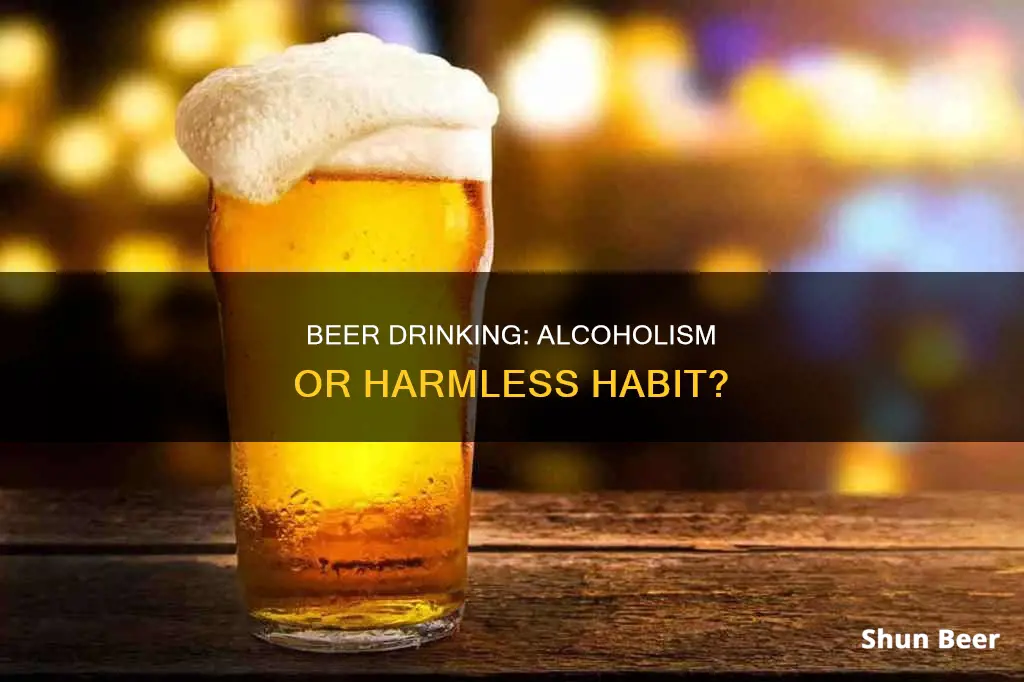
Alcoholism, or alcohol use disorder (AUD), is characterised by a persistent craving for alcohol and withdrawal symptoms when one stops drinking. While beer is often perceived as a harmless adult beverage, it contains alcohol and excessive consumption can lead to legal intoxication and adverse health effects. Popular stereotypes of alcoholics, such as the portrayal in the media, may contribute to the misconception that drinking only beer does not constitute alcoholism. However, regardless of the type of alcoholic beverage, binge drinking or heavy alcohol use can indicate a severe problem requiring detox and treatment.
What You'll Learn

Beer drinkers can be alcoholics
It is a common misconception that beer drinkers are less likely to become alcoholics than other types of drinkers. This is a myth that can give people a false sense of security. Many alcoholics use the fact that they only drink beer as proof that they do not have a drinking problem. However, the question is not what someone drinks but how they drink. Beer contains alcohol, and abusing it will lead to problems.
The stereotype of an alcoholic is someone who drinks cheap hard liquor, is always drunk, drinks alone, is unable to hold down a job, is estranged from their family, becomes aggressive when drinking, drinks in the morning, doesn't take care of their hygiene or appearance, doesn't have much money, and has a history of legal problems due to their behaviour while intoxicated. However, this stereotype is not always accurate. Alcoholics might only drink expensive beers or wines, be high-functioning and successful in their careers, hide their drinking from family and friends, and avoid drinking until the evenings. They can come from any social class, race, nationality, religion, or political affiliation.
Beer drinking carries the same risks as drinking other types of alcohol, as well as some additional dangers. Excessive alcohol consumption can lead to health problems such as obesity, nutritional deficiencies, liver disease, and an increased risk of developing type II diabetes. Beer is high in calories but has low nutritional value, and the intoxication effects take longer to be felt, which can lead to consuming more alcohol than intended. Additionally, the misconception that beer is harmless can lead to excessive drinking, and the social consequences of heavy drinking can be devastating, including divorce, domestic violence, unemployment, and poverty.
It's important to understand your drinking habits and be aware of the signs of a drinking problem, such as feeling guilty or ashamed about your drinking, lying about your drinking habits, needing to drink to relax or feel better, and regularly drinking more than intended. If your drinking is causing problems in your life, then you may have a drinking problem and should consider seeking help.
Beer and Eliquis: Safe Mix?
You may want to see also

Stereotypes of an alcoholic
The stereotypical image of an alcoholic is often that of a violent, aggressive, red-faced old man, drinking cheap hard liquor from a paper bag. This person is often depicted as being unable to hold down a job, estranged from their family, unable to take care of their personal hygiene, and having a history of legal problems. They are also often portrayed as sloppy, uncoordinated, and having reached "rock bottom" in life.
However, these stereotypes are often misleading and unhelpful, as they do not reflect the reality of alcoholism, which can affect people from all walks of life, regardless of gender, race, social class, or background. Alcoholism is an individual disease, and not everyone who struggles with alcohol fits the stereotypical image.
In reality, alcoholics might only drink expensive beers or wines, be high-functioning and successful in their careers, and be able to hide their drinking from family and friends. They may also be charming, non-aggressive, and able to stop drinking for a day or two. Alcoholics can be rich and well-respected in their communities, with no history of legal problems.
The danger of these stereotypes is that they can prevent people from recognizing their own drinking problem and seeking help. It's important to understand that alcoholism is not defined by what someone drinks, when they drink it, or how much they drink, but rather by the effects of their drinking on their life and the lives of those around them.
Beer and Muscle Gain: Is It Possible?
You may want to see also

Dangers of beer drinking
Beer drinking carries the same risks as drinking any other alcoholic beverage, but with some additional dangers. Firstly, beer contains many calories—one bottle can contain as many as 430 calories. Excessive drinking can lead to obesity and related health problems. Beer also has low nutritional value, and those who replace meals with it can suffer from nutritional deficiencies that damage their organs.
Beer drinkers may also take longer to become intoxicated than those drinking spirits, which can lead to greater alcohol consumption over time. This is compounded by the common misconception that drinking beer is safer than other forms of alcohol consumption, leading to excessive drinking. Alcohol is a toxin that damages every organ in the body, and even occasional binge drinking can put people at risk of alcoholic liver disease.
Intoxication also lowers inhibitions, leading to poor decision-making and increased risk-taking. Excessive alcohol intake can be highly damaging to mental health and is linked to an increased risk of suicide, domestic violence, and other types of violence.
In addition to the general dangers of alcohol, beer drinking specifically can increase the risk of pancreatitis, a condition where the ducts that fluids flow out of in the pancreas become clogged. Beer drinking can also negatively affect the gut microbiome, killing good bacteria and allowing bad bacteria to grow unchecked, leading to problems with digestion, inflammation, and organ damage.
Beer and Nicotine: A Risky Mix?
You may want to see also

Alcoholism and health
Alcoholism, or an alcohol use disorder (AUD), is a chronic relapsing disease that affects all aspects of a person's life, including their physical and mental health, emotional stability, finances, career, and relationships. It is characterised by compulsive patterns of alcohol use, which can have dangerous consequences for the individual and those around them.
Health Risks of Alcoholism
Alcoholism can lead to serious health complications, affecting virtually every organ in the body, including the brain and liver. Excessive alcohol consumption is associated with an increased risk of high blood pressure, heart disease, stroke, liver disease, digestive problems, and cancer. It can also result in nutritional deficiencies and obesity due to the high calorie content of alcoholic beverages.
Signs and Symptoms of Alcoholism
Signs that indicate a person may have a drinking problem or alcoholism include:
- Feeling guilty or ashamed about drinking
- Lying about or hiding drinking habits
- Needing to drink to relax or feel better
- Regularly drinking more than intended
- Drinking to cope with difficulties or avoid feeling bad
- Experiencing withdrawal symptoms when trying to reduce alcohol intake
- Inability to cut down or quit drinking
- Giving up important activities to spend more time drinking
Treatment Options
Treatment for alcoholism typically involves addressing both the physical and psychological aspects of the addiction. Detox programs and residential addiction recovery centres can help individuals safely withdraw from alcohol and address the underlying issues contributing to their addiction. Inpatient and outpatient rehabilitation facilities offer round-the-clock care and support to aid in the recovery process.
Moderation Management (MM) programs are another approach that helps individuals learn to drink in moderation by identifying triggers, adopting healthy behaviours, and managing their drinking habits. However, these programs may not be suitable for everyone, especially those with moderate or severe alcohol use disorder.
Seeking help and support is a crucial step in overcoming alcoholism and improving overall health and well-being.
The Magic of Bottoms-Up Draft Beer: How Does It Work?
You may want to see also

Signs of a drinking problem
Alcoholism, or alcohol use disorder (AUD), is characterised by a constant craving for alcohol and withdrawal symptoms when one stops drinking. Beer, like any other alcoholic drink, can lead to alcohol dependence.
- Increased tolerance to alcohol: You may find that you need to drink more than before to get drunk or feel the buzz. This is because your brain adapts to alcohol over time and becomes less sensitive to its effects.
- Intense cravings: You may experience a strong urge to drink that is triggered by people, places, things, or times of day that remind you of drinking. Certain emotions or physical sensations can also trigger a craving.
- Drinking in secret: This may include drinking alone, drinking in the morning, or keeping stashes of alcohol around.
- Prioritising drinking: You may find that drinking takes precedence over other interests and hobbies, as well as the needs of others.
- Impact on work, school, or home life: Drinking may be causing you to neglect your responsibilities, leading to missed deadlines, poor performance at work or school, or issues at home.
- Risky behaviour: Alcohol can impair your judgment and lead to risky behaviour such as drunk driving, fighting, or having unsafe sex.
- Relationship problems: Drinking may be causing friction in your relationships, or making existing problems worse.
- Health issues: You may continue to drink even though it is causing or exacerbating health problems. Alcohol can damage your liver, heart, brain, pancreas, and immune system, and increase your risk of certain cancers.
- Legal trouble: You may have had run-ins with the law due to your alcohol use, such as arrests or other legal issues.
- Inability to cut back: You may have tried to reduce your drinking but found it difficult to do so. This could be a sign of alcohol dependence.
- Withdrawal symptoms: When you try to cut back or stop drinking, you may experience unpleasant withdrawal symptoms such as trouble sleeping, shakiness, restlessness, nausea, or sweating.
- Social activities revolve around drinking: Your social life may centre around alcohol-related activities, such as going to bars or drinking with friends.
Beer Butt Chicken: Does It Work?
You may want to see also
Frequently asked questions
Yes, you can be an alcoholic even if you only drink beer. Alcoholism, or alcohol use disorder (AUD), is defined as having a craving for alcohol that can't be satisfied until you take a sip and continuing to drink even when you should stop. Stereotypes about what an alcoholic looks like or drinks may lead people to believe they are not alcoholics, but these stereotypes are unhelpful and can make it harder for people to recognize they have a problem.
Binge drinking is consuming a large amount of alcohol in a short period, resulting in a blood alcohol concentration (BAC) of 0.08% or higher. For men, this means five drinks in two hours, and for women, it's four drinks in two hours. Heavy alcohol use is defined as drinking 14 or more drinks per week for men and seven or more drinks per week for women.
Some signs of alcohol dependence include increased tolerance, intense cravings, drinking in secret or alone, prioritizing drinking over other activities, continuing to drink despite negative consequences, and being unable to stop once you've started. If you notice any of these signs, it's important to seek help and begin treatment for alcohol use disorder.







